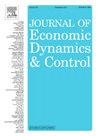Cooperation in temporary partnerships
IF 1.9
3区 经济学
Q2 ECONOMICS
引用次数: 0
Abstract
The literature on cooperation in infinitely repeated Prisoner's Dilemmas covers the extreme opposites of the matching spectrum: partners, a player's opponent never changes, and strangers, a player's opponent randomly changes in every period. Here, we extend the analysis to settings where the opponent changes, but not in every period. In these temporary partnerships, players can deter some deviations by directly sanctioning their partner. Hence, relaxing the extreme assumption of one-period matchings can support some cooperation also off equilibrium because a class of strategies emerges that are less extreme than the typical “grim” strategy. We establish conditions supporting full cooperation as a subgame perfect equilibrium under a social norm that complements direct sanctions with a cyclical community sanction. Though this strategy less effectively incentivizes cooperation, it more effectively incentivizes punishment after a deviation, hence, can be preferable to the grim strategy under certain conditions.
临时伙伴关系中的合作
关于无限重复囚徒困境中的合作的文献涵盖了匹配范围的极端对立面:伙伴,玩家的对手永远不会改变,陌生人,玩家的对手在每个时期随机变化。在这里,我们将分析扩展到对手发生变化的场景,但不是在每个时期。在这些临时合作关系中,玩家可以通过直接制裁他们的合作伙伴来阻止一些偏差。因此,放宽单周期匹配的极端假设可以支持一些非均衡的合作,因为出现了一类比典型的“严峻”策略不那么极端的策略。我们建立了支持充分合作的条件,将其作为一种社会规范下的子博弈完美均衡,这种社会规范以周期性的社区制裁来补充直接制裁。虽然该策略对合作的激励效果较差,但在偏离后对惩罚的激励效果较好,因此在一定条件下优于严峻策略。
本文章由计算机程序翻译,如有差异,请以英文原文为准。
求助全文
约1分钟内获得全文
求助全文
来源期刊

Journal of Economic Dynamics & Control
ECONOMICS-
CiteScore
3.10
自引率
10.50%
发文量
199
期刊介绍:
The journal provides an outlet for publication of research concerning all theoretical and empirical aspects of economic dynamics and control as well as the development and use of computational methods in economics and finance. Contributions regarding computational methods may include, but are not restricted to, artificial intelligence, databases, decision support systems, genetic algorithms, modelling languages, neural networks, numerical algorithms for optimization, control and equilibria, parallel computing and qualitative reasoning.
 求助内容:
求助内容: 应助结果提醒方式:
应助结果提醒方式:


